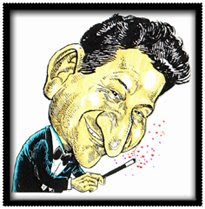
Giovanni Bartholomew (Bartolomeo) Bosco (January 3, 1793 - March 7, 1863) was an Italian illusionist born in Turin who became one of the greatest conjurers of the 19th century.
After his studies in Turin, he enlisted in the Napoleonic army participating in the campaign of Russia as a soldier. In 1812, Bosco was taken prisoner during the Battle of Borodino and confined to Siberia. It was during his imprisonment that he found his extraordinary talent for performing. He preformed for soldiers and for the Russians, which he actually got paid for. He used his gains to alleviate the suffering for himself and his companions.
He returned to freedom in 1814, after a short period of medical studies in Turin, he began his artistic career as an illusionist, achieving success and international fame along with the admiration of many of the kings of Europe.
"Les Aventures de Bartolomeo Bosco de Turin, professeur de prestidigitation", published in 1851, testifies to the enormous fame enjoyed by the great illusionist of Turin.
Bosco spoke and performed in eleven languages. He is best known for his performance of the Cups and Balls and switching the heads of two live birds (one white and one black).
He died in Dresden in 1863 where he was buried in the Catholic cemetery of Friedrichstrasse. Bosco died in poverty after subsidizing his son, Eugene Bosco, for a number of years. In 1903, Houdini found Bosco's grave was dilapidated and purchased the the plot. He handed it over to the Society of American Magicians, starting a tradition of fraternal grave guardianship that still continues to this day.
Bosco was so well-known that after his death there were many magicians that performed under his name to capitalize on his fame. He was described in Robert-Houdin's Memoirs.
After his studies in Turin, he enlisted in the Napoleonic army participating in the campaign of Russia as a soldier. In 1812, Bosco was taken prisoner during the Battle of Borodino and confined to Siberia. It was during his imprisonment that he found his extraordinary talent for performing. He preformed for soldiers and for the Russians, which he actually got paid for. He used his gains to alleviate the suffering for himself and his companions.
He returned to freedom in 1814, after a short period of medical studies in Turin, he began his artistic career as an illusionist, achieving success and international fame along with the admiration of many of the kings of Europe.
"Les Aventures de Bartolomeo Bosco de Turin, professeur de prestidigitation", published in 1851, testifies to the enormous fame enjoyed by the great illusionist of Turin.
Bosco spoke and performed in eleven languages. He is best known for his performance of the Cups and Balls and switching the heads of two live birds (one white and one black).
He died in Dresden in 1863 where he was buried in the Catholic cemetery of Friedrichstrasse. Bosco died in poverty after subsidizing his son, Eugene Bosco, for a number of years. In 1903, Houdini found Bosco's grave was dilapidated and purchased the the plot. He handed it over to the Society of American Magicians, starting a tradition of fraternal grave guardianship that still continues to this day.
Bosco was so well-known that after his death there were many magicians that performed under his name to capitalize on his fame. He was described in Robert-Houdin's Memoirs.




















